The Lack of Breastfeeding
This problem has the following dimensions:
- Unwillingness and inability to breastfeed a child;
- The short duration of breastfeeding;
This phenomenon can pose such threats as:
- Greater risk of diabetes, obesity, and food allergies among children (Kwabi-Addo, 2017);
- Ovarian cancer, postnatal depression, and overweight among mothers.
The lack of breastfeeding should be of great concern to medical workers because this problem is associated with various health complications. The babies, who were exclusively breastfed by their mothers, are usually much healthier than the children who did not have this opportunity (Kwabi-Addo, 2017). This problem can lead to many adverse consequences that manifest themselves during childhood and adolescence. Additionally, one should not forget about the health of mothers who may also be exposed to the risk of some diseases (Buttaro, Trybulski, Polgar-Bailey, & Sandberg-Cook, 2017).
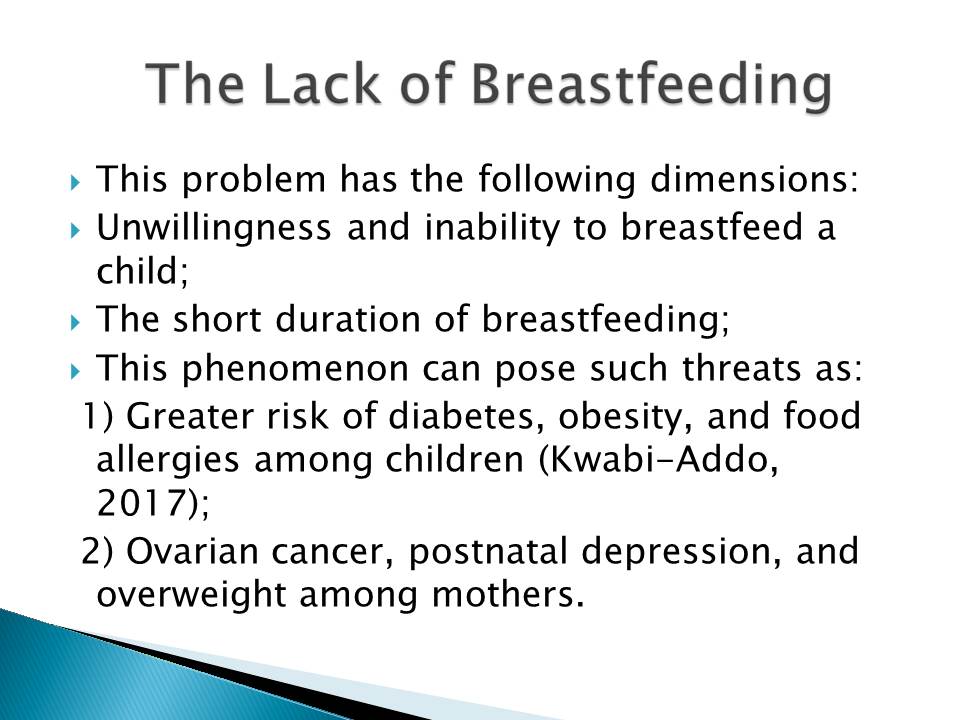
Summary of Relevant Literature
Low rates of breastfeeding are attributed to the following factors:
- Physiological problems preventing mothers from breastfeeding (Sinha, Miall, & Jardine, 2018);
- Lack of breastfeeding skills;
- Inadequate knowledge about the positive impacts of this practice.
Very often, medical workers can modify only the last two factors.
There are serious illnesses depriving a women of the ability to breastfeed her baby. For instance, untreated tuberculosis makes breastfeeding impossible (Sinha et al., 2018). Moreover, sometimes, mothers cannot do it when they take some medications that are not safe for a child. However, many problems can be effectively addressed if mothers acquire skills. Better understanding of breastfeeding and its positive impacts can compel women to adopt this behavior. Thus, one can argue that educational interventions will play a critical role in addressing this issue.
Educational techniques recommended by researchers:
- Prenatal and postpartum education (Schreck et al., 2017);
- The use of several teaching techniques (Pitts, Faucher, & Spencer, 2015);
- Incorporation of various media such as printed materials and online programs.
These approaches can bring the following improvements:
- Greater motivation to breastfeed;
- Longer duration of breastfeeding;
- Increased number of breastfeeding women.
Medical workers and researchers understand that education is essential for shaping the health behaviors of patients. The studies indicate that certain interventions can persuade women to breastfeed their newborn babies. In particular, they argue that medical workers have to rely on both prenatal and postpartum education since this strategy can have a stronger impact on the motivation of women. Additionally, scholars report that nurses should make use of different teaching methods and media because this approach can suit the needs of women with different learning styles.
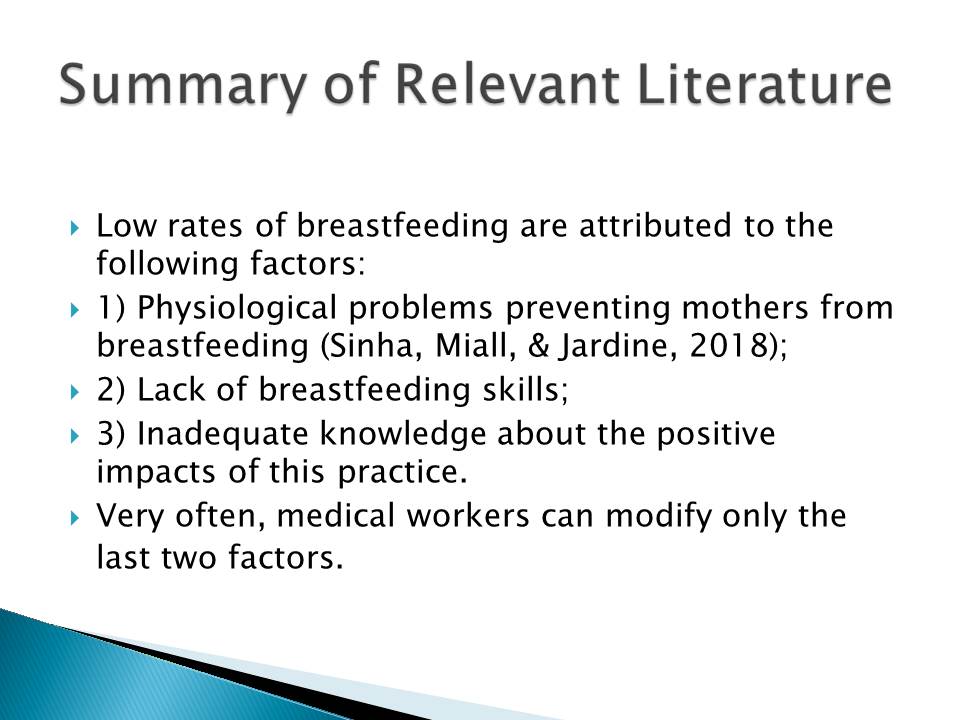
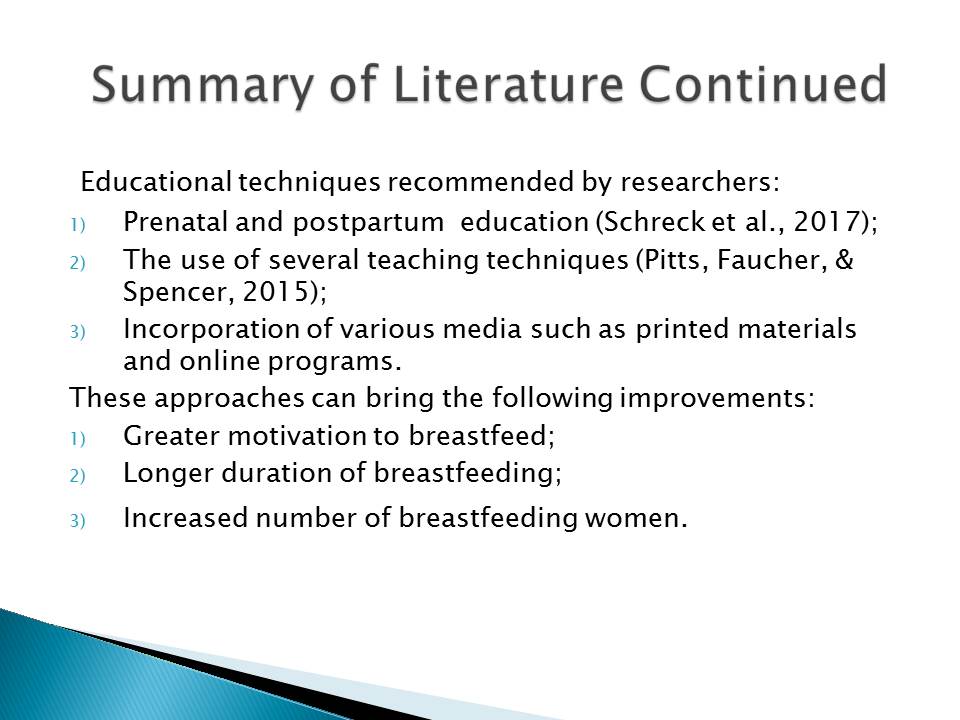
Project Details
- Setting: a healthcare organization serving the needs of pregnant women;
- Recipients: mothers visiting clinics during prenatal and postnatal stages;
- Participants: nurses and physicians educating patients;
- Other stakeholders: hospital administrators;
- Expected duration: 12 months.
This project will be intended for the needs of women who visit hospitals before and after delivery. The plan will be implemented by nurses; they will adopt different educational methods for convincing women that children should be breastfed. Much attention will be paid to the selection of patients who will take part in this program. In particular, one should speak about those mothers who do not suffer from any disease that makes breastfeeding impossible. The implementation of this plan will require several assessments that will have to be conducted before the delivery and at the postnatal stage.
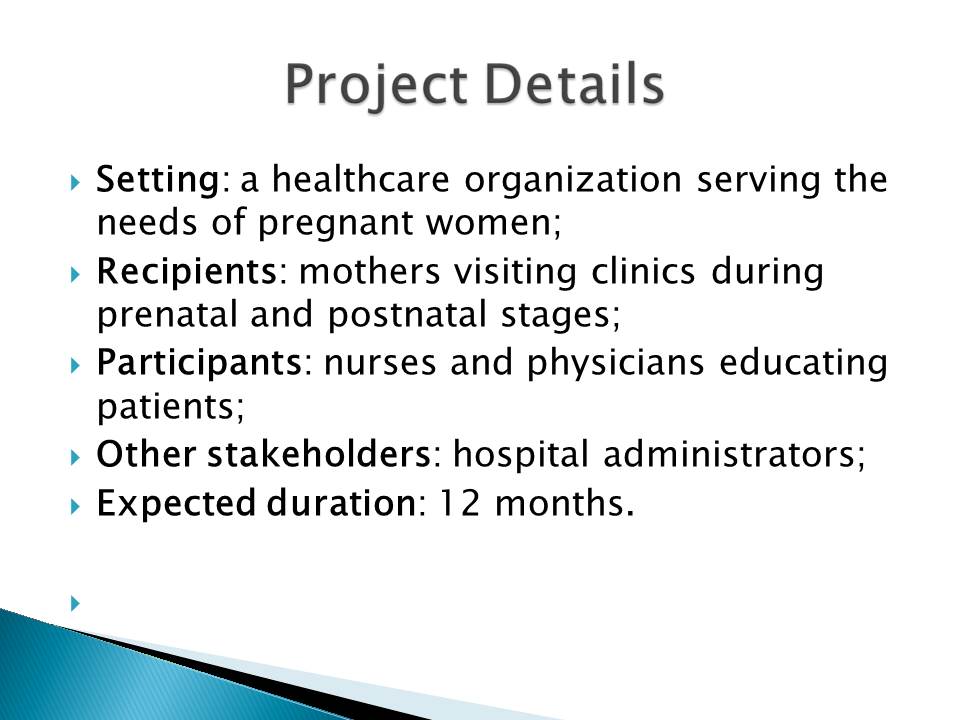
Project Details: Implementation Plan
- Developing a finance plan;
- Recruiting nurses and midwives;
- Communicating with pregnant women and receiving their informed consent;
- Implementing educational interventions;
- Assessing the impacts of education on the behavior and attitudes of women;
- Presentation and dissemination of results.
At present, this plan has yet to be implemented due to the long duration of the project and the need to recruit a great number of nurses. Additionally, hospital administrators should organize training for nurses. In particular, these professionals should learn about the most effective teaching methods that can increase the likelihood of breastfeeding. Secondly, it will be vital to recruit people who will gather data about the impacts of different teaching methods on the health choices of mothers. Such procedures will be essential for assessing the effectiveness of this plan.
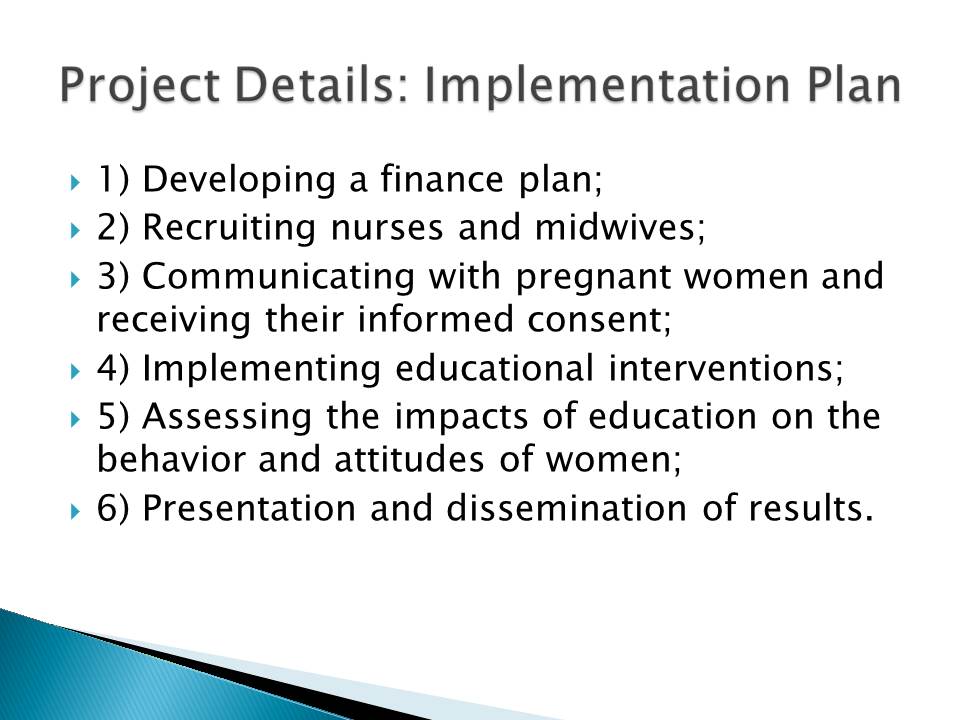
Summary of Project: Resolution of the Problem/Concern
- Proposed solution: the combination of different educational techniques adopted during the prenatal and postnatal stages;
- Evidence: scholarly studies conducted within the last five years;
- Change theory: the health belief model (HBM);
- Ethical issues: the need to receive informed consent of participants;
- Barriers: the shortage of personnel.
The proposed solution relies on the principles of the HBM that describes various factors influencing the health choices of an individual. It is critical to mention people’s perceptions of certain behaviors and their beneficial impacts (Glanz, Rimer, & Viswanath, 2015). For example, an individual may be ready and willing to modify his/her conduct if he/she thinks that such changes can bring improvements. The educational interventions will focus on awareness about the advantages of breastfeeding and the skills of mothers. This project can be slowed down due to the shortage of personnel. Medical workers should recognize the ethical duties that they owe to patients. In particular, these people should be informed about the goals of the project. Moreover, the informed consent of patients should be obtained.
The assessment of this initiative will involve the use of several surveys and interviews that will examine the following aspects:
- The willingness of women to breastfeed;
- Their readiness to breastfeed;
- Awareness about the advantages of breastfeeding;
- The duration of breastfeeding;
- Difficulties experienced during breastfeeding;
- The changes in the percentage of women who intend to rely on exclusive breastfeeding.
The evaluation of this proposal will aim to determine the degree to which educational activities of nurses influenced women’s behavior. Firstly, one has to understand if the teaching methods employed by these professionals increased mothers’ commitment to breastfeeding. Secondly, the surveys conducted by medical workers will show whether the education received by mothers helped them develop skills needed for breastfeeding. After delivery, healthcare providers should interview patients and ask them when they stopped breastfeeding. The results of these surveys can show if this project achieved its goals.
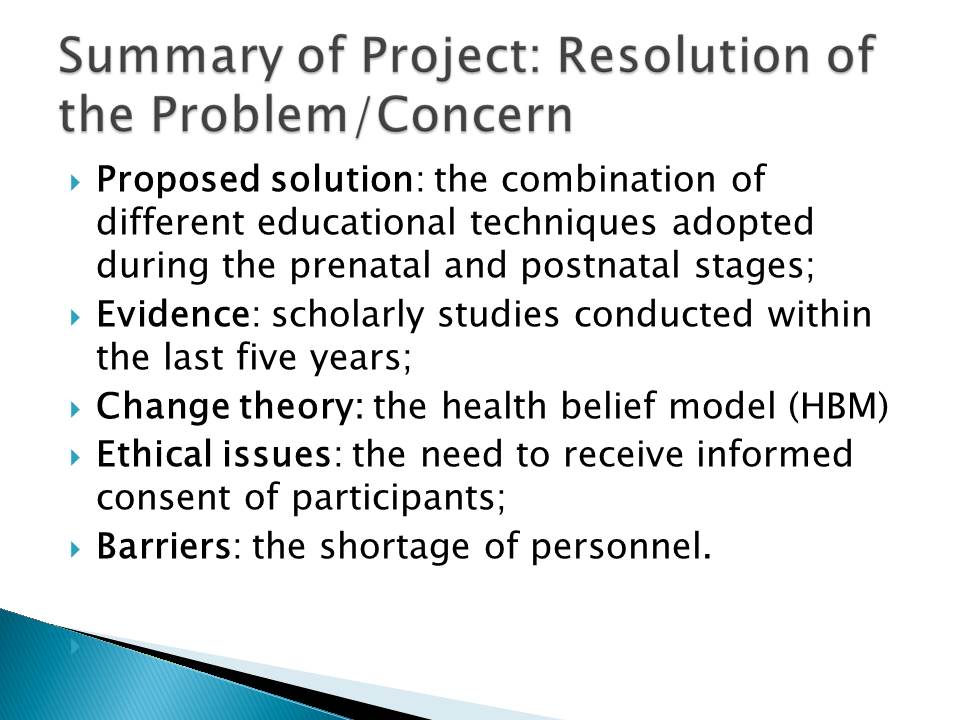
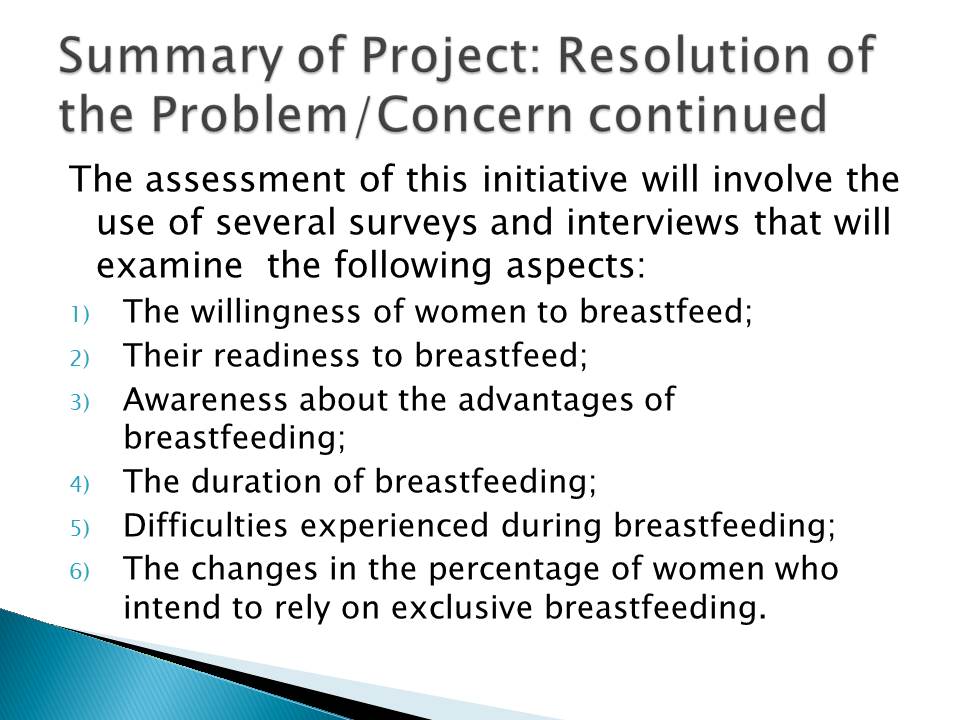
Implications and Next Steps
Several steps will follow the completion of this project:
- The presentation of evidence to colleagues;
- Participation in conferences;
- Publication of reports describing the outcomes of the project;
- Discussion of the findings with other medical workers;
- Improving existing methods of breastfeeding education;
- Illustrating the benefits of evidence-based practices.
This project will carry substantial implications for patients and healthcare organizations. Firstly, the proposed strategies can protect newborn babies against various threats caused by the lack of breastfeeding. Additionally, this plan can underscore the significance of using evidence-based practices. This project will also demonstrate the critical role of nurses as educators who can prompt patients to lead healthy lifestyles. The positive impacts of this project can be increased if its results are discussed with medical workers who can suggest ways of improving current teaching methods.
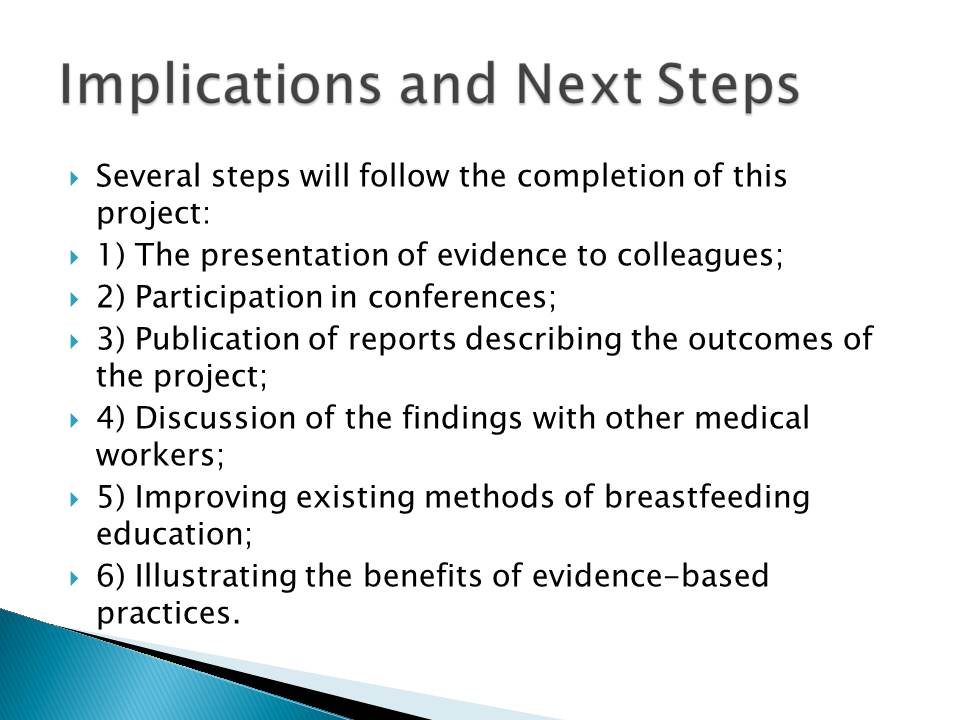
References
Buttaro, T., Trybulski, J., Polgar-Bailey, P., & Sandberg-Cook, J. (2017). Primary care: A collaborative practice (5th ed.). New York, NY: Elsevier Health Sciences.
Glanz, K., Rimer, B., & Viswanath, K. (Eds). (2015). Health behavior: Theory, research, and practice (5th ed.). New York, NY: John Wiley & Sons.
Kwabi-Addo, B. (2017). Health outcomes in a foreign land: A role for epigenomic and environmental interaction. New York, NY: Springer.
Pitts, A., Faucher, M., & Spencer, R. (2015). Incorporating breastfeeding education into prenatal care. Breastfeeding Medicine, 10(2), 118-123.
Schreck, P., Solem, K., Wright, T., Schulte, C., Ronnisch, K., & Szpunar, S. (2017). Both prenatal and postnatal interventions are needed to improve breastfeeding outcomes in a low-income population. Breastfeeding Medicine, 12, 142-148.
Sinha, S., Miall, L., & Jardine, L. (2018). Essential neonatal medicine (6th ed.). New York, NY: John Wiley & Sons.